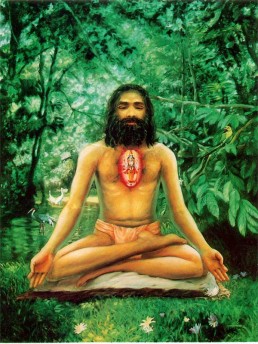Swami Chinmayananda
Swami Chinmayananda Commentary
The meditator who has integrated himself in a single-pointedness, steadily contemplates (Bhajati) upon Me, the Self, which is the essential Spark-of-Life in all forms in the world. Such an individual, whatever be his activities in the external world, ever lives in ‘Me’ through a conscious awareness of the Self. This stanza is given here mainly to indicate that the Man-of-realisation need not necessarily retire to some secret cave in some forgotten valley of the Himalayas, but can maintain his Divine Consciousness in all states of existence, in all conditions of life, and under all happy or unhappy circumstances. When a man is ill, he has to withdraw himself from the fields of activities, strains, and exhausting recreations, and go to a sanatorium to recuperate. Having regained his natural health, he need not thereafter live forever in the sanatorium. On the other hand, he should come back to his old fields of work and live, perhaps a more active life than ever before.
Similarly, a disintegrated man of unhealthy temperament is, in spiritual life, treated through meditation, and when he regains his Godly strength and vitality, he can certainly re-enter the fields of his earlier activity, and yet maintain in himself the cultural perfection and spiritual knowledge that he has gained during his spiritual treatment.
Work, in fact, can be performed and really enduring fruits be gained, only when the worker is established in the Self. The message of the Geeta is that dedicated work is a means of self-development.
There is a deeper significance in the fact that Krishna, the Perfect, is exposing Himself, perhaps, more to the dangers of the battle than Prince Arjuna himself. A charioteer meets the arrows earlier than the warrior who stands behind him! Entering the battlefield, armed with nothing but His irresistible smile, He, in effect, almost becomes the Lord of the battle-field, wherein the entire war, as it were, comes to revolve round Him, the central personality. This means that a Man-of-realisation will in all conditions be able to enter into any activity, and still maintain in himself the unbroken Awareness of the Divine that he is.
While reading this commentary, some students might feel that we are, in our over-enthusiasm, reading a bit too much into the stanza. We can only request them to ponder over the comprehensiveness of the words used in the daring statement: “whatever his mode of life be” (Sarvatha-vartamanopi) the meditator (Yogin)” abides in Me.”
Adi Sankara Commentary
This being so, i.e. after reiterating (in the first line of the present verse) the idea of full realization contained in the previous verse, the result of that (realization), viz Liberation, is being spoken of (in the second line): The yogi, the man of full realization; vartate, exists; mayi, in Me, in the supreme state of Visnu; sarvatha api, in whatever condition; vartamanah, he may be. He is verily ever-free. The idea is that he is not obstructed from Liberation by anything. Furthermore,
The Bhagavad Gita with the commentary of Sri Sankaracharya – Translated by Alladi Mahadeva Sastry
Holy Geeta – Commentary by Swami Chinmayananda
The Bhagavad Gita by Eknath Easwaran – Best selling translation of the Bhagavad Gita
The Bhagavad Gita – Translation and Commentary by Swami Sivananda
Bhagavad Gita – Translation and Commentary by Bhaktivedanta Swami Prabupadha
Srimad Bhagavad Gita Chapter 6 – Verse 31 – 6.31 sarvabhutasthitam yo – All Bhagavad Gita (Geeta) Verses in Sanskrit, English, Transliteration, Word Meaning, Translation, Audio, Shankara Bhashya, Adi Sankaracharya Commentary and Links to Videos by Swami Chinmayananda and others – 6-31

